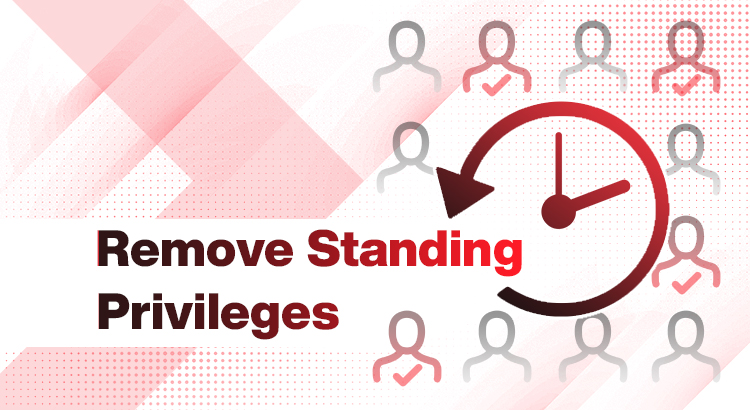An Overview
There is a saying “Too much of anything is bad.” It is believed that too much of anything unnecessary builds up a sense of profuseness which leads to misuse.
It is applicable to IT security as well. Any end-user in an IT environment with unlimited access to critical systems round the clock might turn out to be counter-productive if compromised. With the increase in IT workloads, especially in privileged access environments, organizations tend to manage it in three ways commonly:
- Increase the number of tasks for the existing users
- Increase the number of end-users for any specific workload
- Allow additional privileged rights to the existing users on an ad-hoc basis
While going for the last one, it has been noticed that organizations tend to miss the retraction of elevated privilege after the completion of the task. It results in many unnecessary standing privileges, which pose a huge security threat since the system or application remains exposed to unattended access rights. Malicious insiders, suspicious third-party users, and hackers normally search for similar access control vulnerabilities because it becomes easy to compromise data assets.
Moreover, in different circumstances, IT administrators allow (or add additional) privileged access to the end-users (or privileged users) while shifting (or adding) roles. As a result, “Too Much Access” rights expose the end-user to a risk of unauthorized access.
What are the Risks of “Unlimited Access”?
Organizations have the tendency to ignore the question – what could be the repercussions of the overall access control ecosystem if we go ahead with unlimited access? In the age of digitalization, the proliferation of digital identities is extremely evident. It is a herculean task for the IT risk assessment teams to monitor and manage every user activity, every day, in every application seamlessly. As a result, chances of unauthorized access, data breach, and cyber espionage remains high.
“Unlimited Access” means organizations might lose track of who is accessing what, when, and for which reason. Moreover, once the tasks are over, the privileged rights are not revoked on time which invites risks of unnecessary access. As an obvious result, any anomalous activity remains undetected and unnoticed. Even if the Privileged Access Management (PAM) tools are in place, the fundamental principles sometimes could take a backseat. For instance, non-compliance with the ‘Least Privilege’ principle due to the absence of the Just-in-time (JIT) privilege elevation approach pushes organizations toward multiple risk factors.
How do standing privileges or over-privilege affect security?
The “Verizon Data Breach Investigation Report, 2022” has revealed that almost 74% of data breach incidents involve unauthorized access to privileged accounts. It is so widely spread today, that typical organizations form groups or device-level permissions to allow and execute privileged commands. As a result, even if any user is not directly given access to any system or application, that user’s domain or group-level permission settings often allow them access whenever they require it. It bears higher risks, and it is possible only when there are standing privileges.
However, every time it is not that the privileged rights are not revoked after the completion of the designated task; there are other factors as well. For example, employees who leave their teams or the organization are not always removed on time – group members change, and other accounts are added as privileged accounts, but the privileged account of the ex-employee remains as an unnecessary 24x7x365 access for the malicious actor who uses it as an entry point for a data breach. To be precise, these over-privileged accounts amplify insider threats.
To address this, the just-in-time privilege elevation approach helps enterprises to manage and control unauthorized access risks. Let us see what ARCON | PAM offers.
The benefits of ARCON’s Just-In-Time Privilege Tool
Just-in-time Privilege is a highly essential practice in today’s digital workplace. With the number of privileged accounts rising exponentially due to increasing cloud computing, virtualization, and DevOps practice, the risk surface has expanded. This happens because managing and controlling privileged activities in large distributed environments is always a challenge for IT security admins. Malicious actors exploit the vulnerabilities arising from unmonitored standing privileges and eventually result in financial and reputation damage. Over-privilege entitlements increase data breach risks.
ARCON’s Just-In-Time (JIT) Privilege tool removes the risks from the “Always-on” privilege practice by offering –
- Removal of too many standing privileges that do not follow the “need-to-know” and “need-to-do” access policies
- Denial of Privileged Access once the defined privilege task is completed because the JIT tool revokes privileged rights immediately after the task is over
- To build the foundation for the Zero Trust framework because there are no chances of misusing “trust” with the JIT approach – as privileges are granted only on-demand, hence “trust” is never assumed
- Implementation of the Least Privilege principle and thereby following regulatory compliance
Moreover, in the case of non-privileged accounts, JIT Privilege of ARCON | PAM helps with time-bound access in the following ways:
- Privileged Elevation and Delegation Management (PEDM)
- Use of ephemeral accounts
- Use of ephemeral tokens
Conclusion
The security risk in privileged access control space multiplies when an enterprise creates always-on privileges. It opens new alleys for malicious actors to get unauthorized access to sensitive information. The Just-In-Time (JIT) privilege tool helps organizations to build the foundation of the Least Privilege principle without which role-based access policy can be jeopardized.

